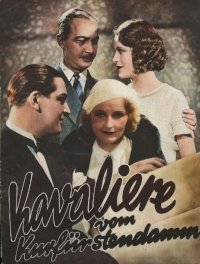
Original Title: Kavaliere vom Kurfürstendamm. (Kavaliere der Nacht.) Crime drama 1932; 85 min.; Director: Romano Mengon; Cast: Friedl Haerlin, Olaf Fjord, Harry Frank, Paul Otto, Hilde Boenisch, Heinrich Heilinger, Angelo Ferrari, Erik Ode, Reinhold Bernt, Albert von Kersten; Mengon-Tobis-Klangfilm.
A “misunderstood” woman goes along with a man who soon reveals himself to be an accomplice of a fence. He abandons her to pursue a relationship with a wealthy girl. However, before that happens, he is caught by the police, while the woman is taken home by her husband.
Summary
Elena Carlson lives with her husband Andre on an island in the Gulf of Naples, but she cannot come to terms with the monotonous life and loneliness. One day, the couple is visited by Georg Landner, who is friends with Andre. Little do they know that Landner is actually working for a fence named Plüschke, who owns a bar in Berlin, and has come to Italy to sell stolen jewelry. When he returns to Berlin, Elena joins him, hoping to satisfy her hunger for life by his side.
Upon arriving in Berlin, she quickly experiences her first disappointment. The next day, she leaves Landner alone in the Berlin boarding house because he has to attend to his business, of which she is still unaware. He now devotes his attention to Ilse Dannhoff, whose father he hopes will give him a high-ranking position in one of his new factories, thus changing his life. He visits Plüschke and collects a commission of one thousand marks for his trip to Italy. However, he declines the new assignment to sell a valuable ring stolen by the criminals Niske, von Poponowsky, and Göritz. When he accepts an invitation from Ilse Dannhoff and stands up Elena, it causes a rift between them.
Due to the various jewelry thefts, the police have begun their investigation. While in Italy, Andre becomes seriously concerned about his friend Landner after a visit from a police detective. Worried about his wife, he travels to Berlin.
In the meantime, Elena realizes the predicament she has gotten herself into and seeks out Ilse Dannhoff to have a conversation. Now Landner realizes that he can no longer accomplish anything and that his hopes will go unfulfilled. He loses his last support and decides to work for Plüschke again. Just as Niske, von Poponowsky, and Göritz attempt to steal a lady’s jewels in the bar, the police intervene. Elena is also arrested as a witness. After she signs the statement, she suddenly finds herself face to face with Andre, who embraces her in his arms.
-j-n.’s review in Film Kurier No. 136 (June 11, 1932)
A Geographic Mistake: The Kurfürstendamm is not located on Dragonerstraße. Geography plays an unfortunate role in this film. It intrudes into the dialogues disguised as embellished costumes, where the essence of such landscape-oriented artifice runs out of steam.
Partly very pretty and melodious music by Schmidt-Boelcke leads us into the dark dealings of these “cavaliers”. Sometimes the music literally ironizes the events note by note, with very witty notes. There is no doubt that fans of swindler and “high society” films will follow these cavalier adventures with interest. However, one should not always blame the Kurfürstendamm for things and people that have nothing to do with it. Isn’t it true? Many who need Berlin as a whipping boy to demonstrate their educational wisdom will particularly welcome this film!
Friedl Haerlin is the woman who runs away from her husband (equipped with the accessories of a magnificent villa on an Italian seaside). After a lyrical marital stay, she embarks on a grand adventure with Harry Frank, who, judging by the numerous colorful stickers on his suitcases, seems at home in all international hotels. Friedl Haerlin is a beautiful, charming woman and a talented actress. She has celebrated great artistic triumphs in Vienna in recent years. One should not judge her cinematic suitability based on the ungrateful role in this film. She undoubtedly needs a director, which she did not have in Romano Mengon. There are a few moments of wonderful suggestion, even when all she has to do is carry her face around. Bet that one day she will truly enrich German cinema?
And then there’s Hilde Boemsch, also promising; bravely striving to assert her naturalness. She has it easier than Friedl Haerlin because Paul Otto’s acting confidence and nobility complement her.
The quote-unquote “cavaliers” are as secure in dance halls and jewel vaults as they are not always with their words. Doesn’t one of them read his two lines from a note inside his hat? Can’t you see the role sheet inside the hat – God forbid – or is it a warrant from the bailiff? But perhaps that’s part of the authenticity of the milieu?
Nevertheless, this portrayal of a society where nobody can be bored because the police are constantly on their heels may send shivers down the spine of those who want to enrich their knowledge of the world of adventurers. Certainly, there is an audience segment that will find this film interesting. Perhaps that’s why Südfilm, which has offered so many hits to the schedule of cinemas, decided to include these “cavaliers”.